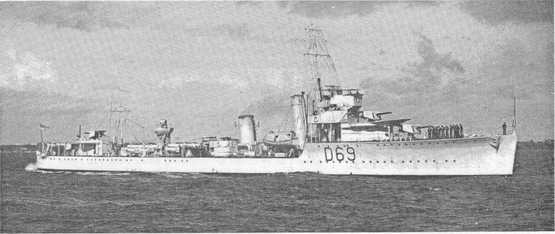- Author
- Hill, Gordon
- Subjects
- Ship histories and stories, WWII operations, History - WW2
- Tags
-
- RAN Ships
- HMAS Vendetta I
- Publication
- June 2010 edition of the Naval Historical Review (all rights reserved)
Memories of HMAS Vendetta in Malta in World War ll
The George Cross Island Association Reunion 2004 gave me the opportunity to revisit Malta. I knew that if I put off visiting the Island again after 64 years it was doubtful I would ever do so. Visiting Grand Harbour, the Docks, the infamous ‘Gut’, Valetta, Sliema, the country towns and villages evoked memories of both happy and sad days of Malta at war.
HMAS Vendetta and the four other destroyers of the V and W squadron from Australia were assigned to the 10th Destroyer Squadron of Admiral Cunningham’s Mediterranean fleet at Malta. We arrived in December 1939 and were soon exercising at sea. The war had not reached the Med and with the French fleet as allies, we sailed supreme in Mare Nostrum, as the Romans called it. Two battle fleets were a magnificent sight and we five little Australian destroyers were proud to be a part of it, destroyer escorts to this mighty armada.
We escorted convoys taking troops to Marseilles, exercised in the Atlantic and visited Gibraltar. On 5th March 1940 I had my 21st birthday in Marseilles, visiting the cabarets and dancing the night away. The French and British armies in the North would defeat the Germans, Poland would be liberated and the war would be over in no time. How quickly things changed. We evacuated troops from Marseilles to Palestine, the French fleet became our enemies and we returned to Malta.
Vendetta was feeling her age after months at sea and it was decided to put her in dock at Malta for a refit. Grand Harbour was full of ships. Plenty of sailors went ashore enjoying themselves. One favourite place in Valetta was ‘The Gut’ a street full of bars. I had a memorable evening with two shipmates and two English squaddies (soldiers) in a room over ‘Dirty Harry’s’ bar. We sang and danced and one girl did the ‘dance of the seven veils’. One soldier had a magnificent voice and sang My Prayer and Indian Summer, two songs I will never forget.
The ship’s company was divided in two. One half went to live and work with the British army RA 4th Coast Regiment and the other half, which I was unfortunate enough to be in, left to work on the ship during the day and to live in the NAAFI canteen. The canteen had facilities for showers and meals but we had to sleep on mess tables or benches, and at the time we thought nothing could be worse.
In dock Vendetta had one set of torpedo tubes removed and a high angle AA gun fitted, a 0.5 multiple machine gun replaced the small gun between the funnels, the mainmast lowered and sundry other work done by the dockyard workers. We carried out general maintenance and cleaned up the mess the dockyard workers invariably left behind each day. The upper deck soon had a new look. The boilers had been cleaned and the work on the engine refit commenced.

On 10 June I left the ship and was walking to the canteen to shower and spend the evening ashore when two army officers excitedly told me ‘the balloon has gone up’ That expression took awhile to sink in but I soon realised that Italy had come into the war. The immediate fear was an Italian invasion by sea and air.
Italy had a menacing naval potential. Her fleet boasted five battleships, twenty five cruisers, ninety destroyers and nearly one hundred submarines. Admiral Cunningham decided to move the units of his fleet in Malta to Alexandria leaving just a few destroyers and other small ships. Vendetta’s refit crew now became dockyard defence and we carried a .303 rifle or (if lucky) a .45 revolver with us at all times to guard against a parachute invasion.
Living in the NAAFI canteen was bad enough, but we were now to be quartered in a tunnel alongside the ship in the graving dock. Fifty men took their hammocks and laid them on the damp tunnel floor and turned in. Next morning we were covered by bites from fleas that infested the walls of the tunnel. The only relief was to dive into the harbour.




